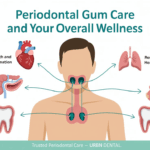Want to Know Fluoride Facts
Fluoride is a naturally-occurring mineral that helps to fight cavities in both adults and children. Fluoride achieves this by making the tooth enamel more resistant to the acid attack that causes dental decay.
Fluoride provides both systemic and topical benefits. The systemic benefits are for children who are yet to grow teeth. Before their teeth erupt, the fluoride taken in from foods and supplements makes the teeth enamels stronger, which makes it easier for the tooth to resist tooth decay. The topical benefits are for adults after their teeth erupt. The fluoride facts taken in from fluoride toothpaste or other fluoride dental products would help to rebuild and strengthen weak tooth enamel and also reverse early signs of dental decay. More so, Fluoride forms part of the saliva, which constantly baths and strengthens the teeth.
Fluoride Facts You Should Know
Potable Water: Fluoride can be gotten from potable water. Naturally, Fluoride is found in almost all water sources, such as the ocean, wells, lakes, and rivers. Since there is a standard Fluoride level that helps to prevent dental decay, public health workers usually add Fluoride to public water supplies to raise the fluoride levels to the necessary amount.
Research showed that Fluoride from the water helps to prevent dental decay by about 25 percent in both children and adults, though they obtain Fluoride from other sources too like toothpaste.
Toothpaste and Mouth Rinse: Most toothpaste and mouth rinse contain Fluoride. According to reports, toothpaste with fluoride has helped in reducing the cases of dental cavities significantly since 1960. When you want to purchase toothpaste and mouth rinse, always look out for products with the ADA Seal of Acceptance.
To ensure that you get the necessary Fluoride from toothpaste and mouth rinse, brush your mouth at least twice daily or as recommended by your dental practitioner. For children under the age of 3, use fluoride toothpaste the size of a grain of rice. For children between the ages of 3 and 6, use fluoride toothpaste the size of a pea. Always monitor your children when brushing to ensure that they use the right amount of toothpaste. More so, always make your children spit out excess toothpaste from their mouth.
Though fluoridated mouthwash can help the teeth to be more resistant to dental decay, it is not advisable to be used by children under the age of six unless if it was recommended by a fluoride dentist near me. This is because the swallowing reflexes of children under the age of six are not fully developed so the children are more likely to swallow the mouthwash than spit it out
Professional Application
There are some customized fluoride products and whitening Fluoride toothpaste that require professional application. You need to visit your fluoride dentist near me for such professional Fluoride application
If your dentist office near me discovers that you have a good chance of getting dental cavities, he or she can apply rinse, foam, gel, whitening Fluoride toothpaste, or other customized fluoride products that will release Fluoride directly to your teeth.
Fluoride Supplement
Fluoride can also be gotten by taking Fluoride Supplements. Fluoride supplements, which come in a lozenge, drop, or tablet form, are available only by prescription. These forms of Fluoride are only recommended for children between the ages of six months and 16 years who are at high risk of developing cavities and who are living in communities with a low amount of fluoride in their drinking water. It is advisable that you consult a pediatrician or fluoride dentist near me about your child’s fluoride needs.
When Do You Need Fluoride Intake?
Children between the ages of six months and 16 years should be given sufficient amounts of Fluoride. This is because their milk and permanent teeth grow at this stage. Adults also need Fluoride to strengthen their teeth and fight tooth decay. Also, people with certain dental conditions may need additional fluoride treatment to help speed up their healing. These dental conditions include:
Dry mouth conditions (xerostomia): Patients with such condition need an additional Fluoride intake. Xerostomia is caused by certain medications, Sjögren’s syndrome diseases, etc. The dry mouth condition makes it very difficult for food particles to be washed away from the mouth or for acids in the mouth to be neutralized.
Gum disease (periodontal disease): This can expose your tooth and tooth roots to bacterial infection and increase your chance of having dental decay.
Frequent dental cavities: Additional Fluoride treatment may be recommended if you suffer from frequent cavities.
If you have metal braces, dental bridges, or dental crowns in your mouth, you may be at risk of having dental decay around the brackets or at the point where the dental crown meets the underlying tooth structure
You may need to ask a fluoride dentist near me to know if you could benefit from an additional fluoride supplement.
Risks Associated With Fluoride Use?
Fluoride is very effective and safe only when it is used according to the prescription of an emergency dentist. However, it can also be toxic at high doses. The toxic dosage level of Fluorine depends on the patients’ individual’s weight. Hence, Fluoride intake must be carefully supervised by a fluoride dentist near me. More so, fluoride toothpaste facts must be carefully checked and read before toothpaste use. Fluoride products must also be kept away from the reach of children, especially those under six years old.
At toxic level, Fluoride can lead to fluorosis, a defect that is predominant in children under the age of six and occurs when the teeth are forming. Fluorosis can lead to barely noticeable white streaks or specks on the teeth or an unpleasant brown discoloration of the teeth.
Normal oral hygiene practices cannot be used to remove tooth staining caused by fluorosis. Only a fluoride dentist near me would be able to remove or lighten these stains using professional bleaches or abrasives.
Nevertheless, it is really difficult to reach a toxic dosage level of Fluorine considering the low levels of fluoride content in toothpaste and other home-based fluoridated products. As a reminder, keep fluoride supplements away from the reach of children and do not encourage swallowing of toothpaste by little children.















